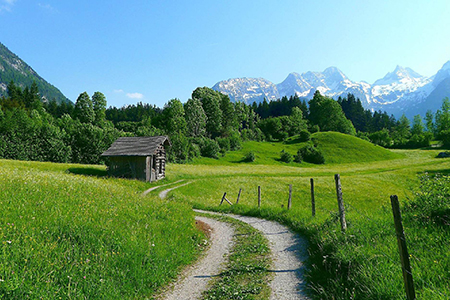Two roads diverged in a wood, and I—
I took the one less travelled by,
And that has made all the difference.
- Robert Frost, “The Road Not Taken”
If you are asked to sketch an image of the journey towards God’s kingdom, what would it look like? Is the path narrow or wide? Straight or winding? Smooth or bumpy? Flat or hilly? Strewn with rocks and thorns, or green grass and flowers? Do you see trees along the way? Are there many crossroads? Is the environment noisy or quiet? Is it cloudy or sunny? Stormy or calm? Are there sounds of animals, birds, or insects around you? Do you see other travellers? Are they walking with you or in the opposite direction?
In a way, this week’s readings present a narrative - an affirming image - of our journey towards the heavenly Jerusalem, God’s “holy mountain”, where we will bask in the glory of God. Both Isaiah and Luke offer a glimpse of our destination and what can be expected at the end of this road trip. Isaiah portrays a scene of pure joy, festivities, and celebrations: an endless convoy of people from “nations of every language” riding on “horses and in chariots, in carts, upon mules and dromedaries”, joyfully entering “Jerusalem, [God’s] holy mountain” (Is 66:18, 20). Luke also describes a similar scene of jubilation, “And people will come from the east and the west and from the north and the south and will recline at the table in the kingdom of God” (Lk 13:29). Unfortunately, not everyone invited chooses to follow through; some only show up for the good times, like those who “ate and drank in [Jesus’] company”, but shy away from anything that requires a genuine change of heart (Lk 13:26). Jesus warns, “there will be wailing and grinding of teeth when you see Abraham, Isaac, and Jacob and all the prophets in the kingdom of God and you yourselves cast out” (Lk 13:28).
We know what the road trip looks like at the end, but what about the journey itself? This week’s readings tell us that challenges and obstacles are certainties along the way but we always have a choice between turning around to avoid them or confronting them head-on. Are we going to take the well-travelled road or “the one less travelled by” (Frost, “The Road Nolt Taken”)? Contrary to conventional wisdom that urges one to choose the path of least resistance, Jesus urges us to “enter through the narrow gate” (Lk 13:24). This seems like an extremely difficult endeavour that requires almost super human strength. However, Jesus is not simply talking about physical strength but the kind of strength that only finds its roots in our Heavenly Father who is full of compassion and kindness; the kind of strength that urges us on and empowers us to persevere when the going gets tough. This spiritual strength helps us to make difficult choices; choices that may contradict conventional wisdom and social norms. St. Paul urges us not to “lose heart” and to endure our “trials for the sake of discipline. God is treating [us] as children; for what child is there whom a parent does not discipline”? (Heb 12:5, 7). It may seem unbearable at the moment, “but later it yields the peaceful fruit of righteousness to those who have been trained by it (Heb 12:11).
Further, our pilgrimage on earth is rarely a solitary endeavour. Indeed, time alone with our thoughts and time with God in silence are as essential as the air we breathe; however, our journey is, more often than not, a communal effort. God’s love for all humanity is so profound that He desires all of us to enter into His kingdom. He will “come to gather nations of every language and they shall come and see [His] glory” (Is 66:18). How does God accomplish this? Isaiah tells us that God will “send fugitives to the nations, … to the distant coastlands … they shall bring all your brothers and sisters from all the nations as an offering to the Lord'' (Is 66:19-20). Who are these emissaries of God? That’s where we enter the picture. After Jesus’ resurrection, He commissioned His disciples, and by extension, each one of us, to “go into the world and proclaim the good news to the whole creation” (Mk 16:15). When God calls us to journey to Him, He is also asking us to bring our sisters and brothers along. In this way, our individual pilgrimage on earth collides with that of our fellow pilgrims; we become companions on the journey, cheering each other on. Sometimes we may need to slow down and fall into steps with those who need to hear about God’s love; other times we may need to run and catch up when our faith is waning. This journey is not a race, rather, it is an act of love and mutual support.
Jesus is not joking when he tells us, “Strive to enter through the narrow gate, for many, I tell you, will attempt to enter but will not be strong enough” (Lk 13:24). Knowing that the trials in life are our Father’s blessings in disguise, let not our apprehension, doubts, and fear prevent us from entering through the “narrow gate” (Ibid). Next time when you happen upon “two roads diverged in the woods”, take the one less travelled and that would have “made all the difference” (Frost).
